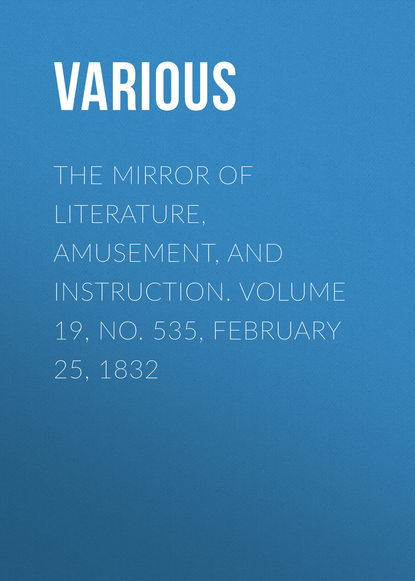По всем вопросам обращайтесь на: info@litportal.ru
(©) 2003-2024.
✖
The Mirror of Literature, Amusement, and Instruction. Volume 19, No. 535, February 25, 1832
Автор
Год написания книги
2018
Настройки чтения
Размер шрифта
Высота строк
Поля
Borgia.—Take these letters, assassin! I had promised to restore them to you. (He hands to Concini a black portfolio.)
Concini.—I would have taken them from your body.
Borgia.—I have performed my promise—and now, ravisher! look to yourself.
Concini.—Base seducer, defend thyself.
Borgia.—The night is dark, but I shall feel you by my hate: Plant your foot against the wall, that you may not retreat.
Concini.—Would I could chain yours to the pavement, that I might be sure of my mark!
Borgia.—Agree that the first who is wounded shall inform the other.
Concini.—Yes, for we should not see the blood. I swear it by the thirst I feel for yours.—But not that the affair should end there.
Borgia.—No, only to begin again with more spirit.
Concini—To continue till we can lift the sword no longer.
Borgia.—Till the death of one or other of us.
Concini—I see you not. Are you in front of me?
Borgia.—Yes, wretch! Parry that thrust. Has it sped?
Concini.—No; take that in return.
Borgia.—I am untouched.
Concini.—What, still? Oh! would I could but see thy hateful visage. (They continue to fight desperately, but without touching each other. Both rest for a little.)
Borgia.—Have you a cuirass on, Concini?
Concini.—I had, but I left it with your wife in her chamber.
Borgia.—Liar! (He rushes on him with his sword. Their blades are locked for a moment, and both are wounded.)
Concini.—I feel no sword opposed to mine. Have I wounded you?
Borgia, (leaning on his sword, and staunching the wound in his breast with, his handkerchief.) No, let us begin again. There!
Concini (binding his scarf round his thigh.)—One moment and I am with you. (He staggers against the pillar.)
Borgia, (sinking on his knees.)—Are you not wounded yourself?
Concini.—No, no! I am resting. Advance, and you shall see.
Borgia (endeavouring to rise, but unable.)—I have struck my foot against a stone—wait an instant.
Concini (with delight.)—Ah! you are wounded!
Borgia.—No, I tell you—'tis you who are so. Your voice is changed.
Concini, (feeling his sword.)—My blade smells of blood.
Borgia.—Mine is dabbled in it.
Concini.—Come then, if you are not *—come and finish me.
Borgia, (with triumph.)—Finish! then you are wounded.
Concini, (with a voice of despair.)—Were I not, would I not have already stabbed you twenty times over? But you are at least as severely handled.
Borgia—It maybe so, or I should not be grovelling here.
Concini.—Shall we now have done?
Borgia, (enraged.)—Both wounded—yet both living!
Concini.—What avails the blood I have drawn, while a drop remains.
Borgia.—O! were I but beside thee! Enter Vitry, followed by the Guards walking slowly. He holds the young Count de la Pene by the hand; the boy leads his sister.
Vitry, (a pistol in his hand.)—Well, my child, which is your father?
Count de la Pene.—Oh! protect him, sir,—that is he leaning against the pillar.
Vitry, (aloud.)—Draw tip—remain at that gate—Guards! (The Guards advance with lanterns and flambeaux.) Sir, I arrest you—your sword.
Concini, (thrusting at him.)—Take it. (Vitry fires his pistol—Du Hallier, D'Ornano, and Person fire at the same time—Concini falls dead.)
The malice of Du Luynes, the inveterate enemy of the D'Ancres, and afterwards the minion of Louis, contrives that the Maréchale, in her way to execution, shall be conducted to this scene, where her husband lies dead, on the spot which had been stained with the blood of Henry, like Caesar at the foot of Pompey's statue; and the play concludes with her indignant and animated denunciation of this wretch, who stands calm and triumphant, while the Maréchale exacts from her son, over the body of Concini, an oath of vengeance against the destroyer of her house.
THE MARTYR-STUDENT
I am sick of the bird,
And its carol of glee;
It brings the voices heard
In boyhood back to me:
Our old village hall,
Our church upon the hill,
And the mossy gates—all
My darken'd eyes fill.
No more gladly leaping
With the choir I go,
My spirit is weeping
O'er her silver bow:











